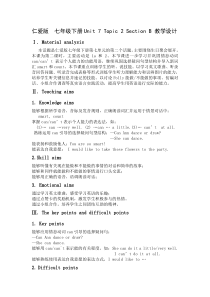 DOC
DOC
【文档说明】《Unit 7 Topic 2 Can you sing an English song》教学设计6-七年级下册英语仁爱(科普版).doc,共(4)页,32.000 KB,由小喜鸽上传
转载请保留链接:https://www.ichengzhen.cn/view-104862.html
以下为本文档部分文字说明:
仁爱版七年级下册Unit7Topic2SectionB教学设计Ⅰ.Materialanalysis本话题是仁爱版七年级下册第七单元的第二个话题,主要围绕生日聚会展开,本课为第二课时,主要活动是1a和2。本节课进一步学习并巩固情态动词can/ca
n’t表示个人能力的功能用语,继续巩固选择疑问句型结构并导入新词汇smart和count。本节课重点训练学生的听、说技能。以学习英文歌曲、听录音回答问题、听录音完成表格等形式训练学生听力理解能力和识辨图片的能力,培养学生听关键信息并速记的技能。以讨论Polly能做/不能做的事项、仿编对
话、小组合作调查等真实语言实践活动,提高学生用英语进行交际的能力。Ⅱ.Teachingaims1.Knowledgeaims能够根据所学语音、音标及发音规则,正确朗读词汇并运用于情景对话中:smart,count掌握can/can’
t表示个人能力的表达法,如:(1)…can…verywell.(2)…can…alittle.(3)…can’tatall.熟练运用can引导的选择疑问句型结构:—CanAnndanceordraw?—Shecandance.能表扬和鼓励他人:Youaresosmart!能表达自我意愿:Iwo
uldliketotaketheseflowerstotheparty.2.Skillaims能够听懂有关现在能做和不能做的事情的对话和简单的故事;能够和同伴就能做和不能做的事情进行口头交流;能够用正确的语音、语调朗读对话;3.Emotionalaims通过学习英文歌曲,感受
学习英语的乐趣;通过点赞卡的奖励机制,激发学生积极参与的热情。通过小组合作,培养学生之间团结互助的精神。Ⅲ.Thekeypointsanddifficultpoints1.Keypoints能够应用情态动
词can引导的选择疑问句:—CanAnndanceordraw?—Shecandance.能够用can/can`t表示能的有关程度,如:Shecandoitalittle/verywell.Ican’tdoitatall.能够熟练使用表达自我意愿的
表达方式,Iwouldliketo…2.Difficultpoints正确使用情态动词can引导的选择疑问句型结构。—CanAnndanceordraw?—Shecandance.突破方式:创设具体真实的语言实践活动,如仿编对话,小组合作完成调查任务并做调查报告等,让
学生自然的在用中学,在学中用。Ⅳ.Learningstrategies能在学习中善于利用图片等非语言信息帮助理解。Ⅴ.Teachingaids实物和多媒体Ⅵ.TeachingproceduresStage1:GetreadyforlearningStep1:GreetingStep2:Si
nganEnglishsong---IcansingitwellStage2:Pre-listeningT:Wecan`tflyatall.Whocanfly?Ss:Birds.T:Thebirdscanflyverywell.Look!Aparrot.ItsnameisPolly.Itlook
ssmart.WhatcanPollydo?Stage3:While-listeningStep1:Listento1aandFinish1b:Listenandcheck(√)whatPollycando.Checktheanswertogeth
er.Step2:Listenagainandanswerthequestions:WhatcanPollydo?Whatcan`tPollydo?ChecktheanswertogetherStage
4:Post-listeningStep1:ShowsomeflowersandaskHowmanyflowers?Let’scount:onetwothree..Thenaskthemtocountthenumbersfrom1to10.Whentheyd
oitteachersaysyouaresosmarttothem.Teachnewwords:countsmart.Step2:Askstudentstoreadaloudandpayattentiontothepro
nunciationandintonation,andthenfindoutthekeypoints.Step3:Talkaboutsomeusefulexpressions.Step4:Actoutth
edialoguesinroleingroups.Stage5:PracticeStep1:T:look!Alittlekid.Canhewalk?Watchashortvideo.Step2:ReviewtheCanquestionsbypresenti
ngpictures.ThenleadinOrQuestions.Step3:Pairwork.A:Canyou/Tom……or……?B:I/Hecan…….I/Hecandoitalittle/verywell.Step4:Listento3aa
ndnumberthepictures.Step5:Listenagainandfinishtheexercises.Stage6:ProjectStep1:Makeasurvey.Thereare4peopleinonegroupaskyourteammateswhatthey
candoandwhattheycan’tdo.Thenfillintheblanks.Youcanusethefollowingsentencesandphrases.1.A:Whatcanyoudo?B:Ican…2.A:Canyou…
?B:Yes,Ican/No,Ican’t.3.A:Canyou…or…?B:Ican…singChinesesongssingEnglishsongsdancetodiscoperformballetplaytheguitarplaygameslistentomusicswimta
kephotoscookspeakEnglishspeakJapaneseStep2:ReportT:Youcanreportlikethis:XXcan…alittle/verywell,butshe/hecan’t…atallStage7:Summary.Learnthenewword
s:smart,countFurtherlearn“can”and“can’t”forabilityandinability.(1)Canyoucountthemforme?(2)--CanAnndanceordraw?--Shecandan
ce.Shecandoitalittle/verywell.Stage8:DoExercise1.--CanyousingsomeChinesesongs?--_____A.Yes,youcan.B.Yes
,Ican.C.Yes,Ido.D.No,Ican.2.Icanplaytheguitar,butLily_____thepiano.A.canplaysB.cansplayC.cansplaysD.canplay3.--CanTomrideab
ikeordriveacar?--_____A.Yes,hecan.B.No,hecan’t.C.Hecanrideabike.D.Hecandrivesacar.4.Jimcanplaybasketball_____,buthecanplaysoccer_____.A.alittl
e,verygoodB.afew,verywellC.alittle,verymuchD.alittle,verywell1)表扬鼓励他人可以怎么说?Youaresosmart.2)如何表示自己想把这些花带到聚会上去的意愿。I`dliketotaketheseflowerstoth
eparty.3)询问他人能帮我数数这么多书吗?。Canyoucountsomanybooksforme?4)告诉同伴能弹吉他,但一点儿也不会游泳Icanplaytheguitar,butIcan’ts
wimatall.Homework.1.Read1a,andmakeupconversationswithyourclassmates,using“can/can’t,or,verywell/alittle.”2.Writeanarticletointroduceyourbestfriendwi
thcan,can’t,verywell,notatall,alittle,notverywell.Blackboarddesign:Unit7Topic2CanyousinganEnglishwell?count[kaʊnt]I`dliketotakethesef
lowerstotheparty..smart[smɑːt]Canheswim?countforNo,hecan’tdoitatall.taketoCanAnndanceordraw?somanyShecandance.Shecandoitalittle/
verywell.Teachingreflection:本节课进一步学习并巩固情态动词can/can’t表示个人能力的功能用语,继续巩固选择疑问句型结构,在上节课的教学中,我们对本节课的学习做了铺垫,因此,教学进展比较顺利。本节课重点训练了学生的听、说技能,以讨论Polly能做/不能做
的事项、仿编对话、小组合作调查等真实语言实践活动,学生自然的在用中学,在学中用,提高了用英语谈论能做和不能做的事情的交际能力。
 辽公网安备 21102102000191号
辽公网安备 21102102000191号
 营业执照
营业执照